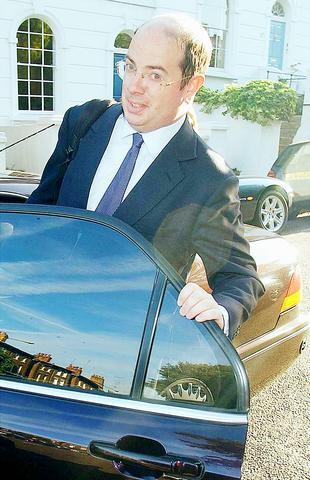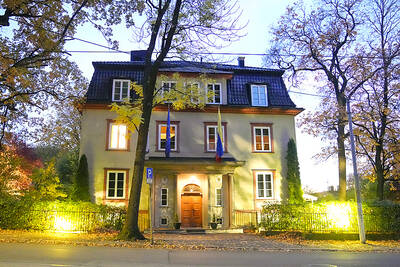The BBC reporter Andrew Gilligan was left isolated at the Hutton inquiry Wednesday when he was forced to retract key elements of his controversial Today radio programme report while the corporation's head of news denounced his journalistic standards.
In tough cross-examination lasting two and a half hours, Gilligan said he had made a "slip of the tongue" when he reported that Downing Street inserted a claim in the September dossier that Iraq could launch weapons of mass destruction within 45 minutes, knowing it was wrong.
He also conceded it was a mistake, in one of his broadcasts, to describe the weapons expert David Kelly as an "intelligence service source." And he admitted failing to correct Today presenter John Humphrys for making the same error.

PHOTO: AP
Richard Sambrook, the BBC's director of news, said Gilligan failed to appreciate the "nuances and subtleties" of broadcast journalism, casting his reports in "primary colours" rather than shades of grey.
Both admitted it was a serious error of judgment for Gilligan to email members of the foreign affairs committee, suggesting questions that they might ask of the government scientist David Kelly and effectively outing him as the source for reports by the BBC Newsnight journalist Susan Watts. Kelly's body was found three days after appearing before the FAC, apparently after taking his own life, leading to the setting up of Lord Hutton's inquiry.
Gilligan's appearance yesterday was his second: the investigation has moved into a more probing phase in which witnesses are cross- examined by lawyers acting for various parties.
Under questioning from Jonathan Sumption QC, for the government, Gilligan said of his email to a FAC member: "It was quite wrong to send it and I can only apologise. I did not even know for sure that David Kelly was Susan Watts' source. I was under an enormous amount of pressure at the time and I simply was not thinking straight, so I really do want to apologise for that."
Sambrook said later: "It was an improper email to have been sent. I do not think it would be right under any circumstances. I appreciate Gilligan felt himself to be under a great deal of pressure and may have made a misjudgment in those circumstances."
Gilligan admitted errors in his 6.07am broadcast on Today on May 29, when he quoted his source -- now known to be Kelly -- as accusing the government of publishing the 45-minute claim knowing it was false. "I regret that on this occasion, I did not report carefully and accurately what he said," Gilligan said.

The Venezuelan government on Monday said that it would close its embassies in Norway and Australia, and open new ones in Burkina Faso and Zimbabwe in a restructuring of its foreign service, after weeks of growing tensions with the US. The closures are part of the “strategic reassignation of resources,” Venezueland President Nicolas Maduro’s government said in a statement, adding that consular services to Venezuelans in Norway and Australia would be provided by diplomatic missions, with details to be shared in the coming days. The Norwegian Ministry of Foreign Affairs said that it had received notice of the embassy closure, but no

A missing fingertip offers a clue to Mako Nishimura’s criminal past as one of Japan’s few female yakuza, but after clawing her way out of the underworld, she now spends her days helping other retired gangsters reintegrate into society. The multibillion-dollar yakuza organized crime network has long ruled over Japan’s drug rings, illicit gambling dens and sex trade. In the past few years, the empire has started to crumble as members have dwindled and laws targeting mafia are tightened. An intensifying police crackdown has shrunk yakuza forces nationwide, with their numbers dipping below 20,000 last year for the first time since records

EXTRADITION FEARS: The legislative changes come five years after a treaty was suspended in response to the territory’s crackdown on democracy advocates Exiled Hong Kong dissidents said they fear UK government plans to restart some extraditions with the territory could put them in greater danger, adding that Hong Kong authorities would use any pretext to pursue them. An amendment to UK extradition laws was passed on Tuesday. It came more than five years after the UK and several other countries suspended extradition treaties with Hong Kong in response to a government crackdown on the democracy movement and its imposition of a National Security Law. The British Home Office said that the suspension of the treaty made all extraditions with Hong Kong impossible “even if

CAUSE UNKNOWN: Weather and runway conditions were suitable for flight operations at the time of the accident, and no distress signal was sent, authorities said A cargo aircraft skidded off the runway into the sea at Hong Kong International Airport early yesterday, killing two ground crew in a patrol car, in one of the worst accidents in the airport’s 27-year history. The incident occurred at about 3:50am, when the plane is suspected to have lost control upon landing, veering off the runway and crashing through a fence, the Airport Authority Hong Kong said. The jet hit a security patrol car on the perimeter road outside the runway zone, which then fell into the water, it said in a statement. The four crew members on the plane, which